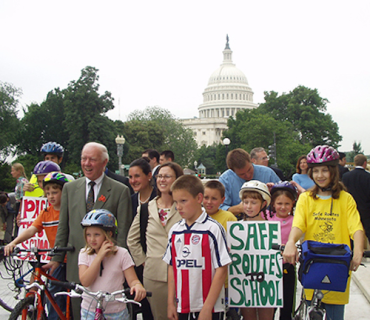


Principals are responsible for supporting the academic success of their students and also for acting as a liaison to parents and the community. Principals can play a key role in championing shared use in their school systems.
The complexities of engaging and educating your governor and state agency leaders on the benefits of policies and funding that support Safe Routes to School can feel daunting, but may be easier than you imagine.
These action briefs are a companion to the webinar "Maximizing City Involvement in Safe Routes to School: Educating Municipal Transportation Departments" that took place on June 20, 2013. Watch an audio-visual recording here. View Powerpoint slides: Gabe Graff, City of Portland- slides; Nancy Nichols, City of Fort Collins - slides.
Student transportation departments have the potential to focus on more than just busing students to school.
There are a variety of approaches to educating and engaging local elected officials as a part of your community’s Safe Routes to School movement.
These action briefs are a companion to the webinar "Maximizing District-Wide Impact of Safe Routes to School: Educating School District Transportation Departments" that took place on April 18, 2013.
One of the best ways to make sure that walking, bicycling, and Safe Routes to School programs are vigorous and sustained over time in your district is to include these programs in school district policies.
Student transportation departments spend their days working to get students safely to and from school, but historically have focused on busing and driving. Safe Routes to School can easily support district transportation departments in identifying ways to safely get children active while commuting to school, while decreasing traffic congestion.
These action briefs are a companion to the webinar "Maximizing District-Wide Impact of Safe Routes to School: Educating School District Transportation Departments" that took place on April 18, 2013.
This checklist offers questions and actions to consider when preparing to work with your school board in support of Safe Routes to School, whether through official board policies, revised procedures, or other approaches.
These action briefs are a companion to the webinar "Maximizing City Involvement in Safe Routes to School: Educating Municipal Transportation Departments" that took place on June 20, 2013.
These action briefs are a companion to the webinar "Maximizing District-Wide Impact of Safe Routes to School: Educating School District Transportation Departments" that took place on April 18, 2013.
This fact sheet provides an overview of why it is important to engage school district leaders in Safe Routes to School and the results that can be achieved through a strong partnership.
These action briefs are a companion to the webinar "Maximizing District-Wide Impact of Safe Routes to School: Educating Principals and School Boards that took place on May 16, 2013.
Superintendents are the chief administrators for school districts. They work to implement the vision and policies that the school board establishes. Superintendents can play a critical role in supporting shared use.
When children get to and from school by walking or bicycling, there are benefits for their health, physical activity levels, and academic achievement. However, sometimes school board members and superintendents don’t understand why walking and bicycling is relevant to their mission.
This tool is designed to help school board members, administrators, families of students, and community members create and implement district policies that support active transportation and Safe Routes to School programs.
These action briefs are a companion to the webinar "Maximizing the Local Impact of Safe Routes to School: Educating Local Elected Officials" that took place on March 21, 2013.
School boards have a crucial role to play in supporting shared use in school districts. This two page brief includes suggestions for shared use advocates working with school boards to advance shared use.
This guide, created through a contract from the Centers for Disease Control and Prevention, is intended to give Safe Routes to School practitioners, teachers, school administrators and others the necessary background information to fully understand the positive benefits of teaching bicycle and pedestrian education in the classroom.
This guide offers practical tools for adult facilitators to support middle school students in the promotion of safe walking, bicycling, and public transit use to and from school. Student-led campaigns can generate enthusiasm and improve the social conditions for a Safe Routes to School program!
These action briefs are a companion to the webinar "Maximizing Statewide Impact of Safe Routes to School: Educating Governors and State Agency Leaders" that took place on February 21, 2013.